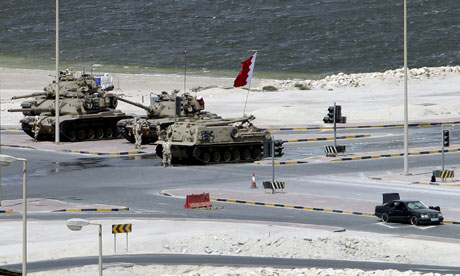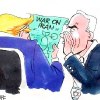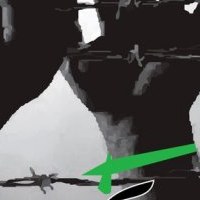![]()
Wed, Oct 19, 2011 | Middle East Forum | American Spectator | by Aymenn Jawad Al-Tamimi

Bahraini army tanks block streets leading to Pearl Square in the capital Manama. (Photo: Joseph Eid/AFP/Getty Images)
Assessing Bahrain
Critics have often argued that Western nations — the United States in particular — have been hypocritical in their policies towards Bahrain. Is this claim accurate? Too often, no full overview has been given on what is going on in the country. Who precisely are the predominantly Shi’a protestors? What is at stake? Most importantly, which outside nations can influence the situation?
Bahrain’s Shi’a majority, under Sunni minority rule since the arrival of the ruling al-Khalifa dynasty around two hundred years ago, has for a long time justifiably complained of problems of discrimination, and while Bahrain began moving in the direction of democratic reform at the turn of this century, the reforms were gradually reversed as the government became concerned that Iran would seek to take advantage of greater political freedom on the island.
Indeed, by 2010, the American human rights think-tank Freedom House had demoted Bahrain from “partly free” to “not free,” citing, among other things, “harassment of opposition political figures” and “worsening sectarian discrimination.”
Now, the rulers’ anxieties over Iranian designs on the island are not entirely unjustified. Iran has made a claim to Bahrain many times (most recently in 2005), and has viewed the country as its fourteenth province since Shah Mohammad Reza Pahlavi’s declaration of this status in November 1957.
Since the protests first began in Bahrain, it has been apparent that there are a number of pro-Iranian, Shi’a Islamists among the demonstrators: specifically the al-Haq movement led by Hassan Mushaima, who are to be distinguished from other Shi’a political movements in Bahrain like al-Wefaq, whose aim, like Iraq’s Shi’a political factions, is generally to ensure that the nation’s Shi’a majority leads the political process, while allowing the al-Khilafa dynasty to remain as a limited, constitutional monarchy, rather than subordinating the country to Iranian interests and plans.
The regime’s mistake, however, has been to view the protesters as a monolithic bloc that is part of an Iranian plot to take over the island. Instead of trying to work towards a compromise with the more mainstream opposition and only putting on trial the likes of Hassan Mushaima, the government has targeted for detention and torture protestors from al-Wefaq and even the secular social democrats of al-Waad. In the case of al-Waad, it is notable that the group’s currently imprisoned leader — Ibrahim Sharif — is a Sunni, and that al-Waad has cautioned protestors to be alert to possible Iranian attempts to take advantage of the demonstrations.
Meanwhile, a group of twenty medical professionals, who merely aided protestors injured at the hands of the security forces during the brutal crackdown on demonstrations, were convicted on charges of trying to overthrow the government. Bahraini officials recently announced their intention to hold a civilian trial for these medical professionals, but questions have rightly been raised regarding how different this new trial will really be.
Unfortunately, the regime’s actions have only helped to trap itself in a vicious circle by empowering the extremists who promote a zero-sum narrative that the government and monarchy must be dismantled completely. The longer the repression continues, the more likely the window of opportunity for a reasonable compromise will disappear completely.
Yet more at fault here is Saudi Arabia and the Gulf Cooperation Council (GCC), which have similarly regarded the protests as an Iranian conspiracy and have accordingly deployed thousands of “Peninsula Shield” troops — drawn from Saudi Arabia, Qatar, Kuwait and the United Arab Emirates — to aid in the repression of demonstrations. Furthermore, Saudi Arabia has looked elsewhere among Sunni nations to recruit support for the Peninsula Shield force.
For example, as the Middle East Media Research Institute reports, in return for Saudi promises to aid Pakistan’s economy, Pakistani private security firms have recruited thousands of active and demobilized Pakistani troops to assist the government in Bahrain, while Malaysia has promised to send additional contingents if necessary.
It is only in light of Saudi Arabia’s and the GCC’s role that one can appreciate why the West can do virtually nothing about Bahrain. Despite repeated calls by Western governments for reform and denunciations of the mass trials and convictions of medical professionals, only the Saudis and the GCC can really influence the path the Bahraini government chooses, and they are simply not listening to Western governments on the subject of Bahrain after the supposed ‘betrayal’ of Hosni Mubarak back in February.
Thus, the West is not being hypocritical about Bahrain at all, even taking into account approval of arms sales to the island. The United States’ primary interest is of course to prevent the likes of Hassan Mushaima from ever coming to power and maintain the base in Bahrain for the U.S. Navy’s Fifth Fleet. Its presence in the Persian Gulf is of course vital to prevent Iran from achieving hegemony over these waters, especially in the event that the country acquires nuclear weapons and can thereby gain a stranglehold over a major route for much of the world’s oil supplies. The West is unhappy with the status quo, but also willing to put up with it because there are no viable ways to convince the government, Saudi Arabia and the GCC that a political compromise is needed. Options are severely limited, and the West is simply acting on its own interests.
Aymenn Jawad Al-Tamimi is a student at Brasenose College, Oxford University, and an intern at the Middle East Forum.



 RSS
RSS










Assessing Bahrain | Middle East, Israel, Arab World, Southwest Asia, Maghreb http://t.co/UlBjwiny
Assessing Bahrain | Middle East, Israel, Arab World, Southwest Asia, Maghreb http://t.co/UlBjwiny
[…] case study of how this works is offered by Aymenn Jawad al-Tamimi in a superb short article, “Assessing Bahrain.” The strength of al-Tamimi’s analysis is that he points out both the real threat […]
Y US ignoring despotic minority #Bahrain: Fear of #Iran influence on Shia majority, 5th US Fleet, Saudi fear of #Iran http://t.co/Op5pQhpF